Watching Russia's Syrian build-up from central Istanbul
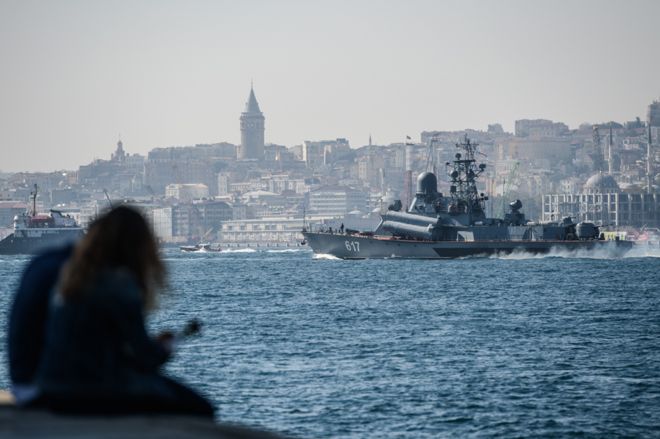 Image copyright Getty Images
Image copyright Getty Images
The ship spotters of Istanbul have become a key resource for diplomats and intelligence experts, alerting the world to the scale of Russia's campaign in Syria.
It's almost midnight. I've just got to sleep at the end of a long day travelling to Istanbul, when my phone beeps with a message."Slightly bad news," it says.
"Alexander Tkachenko will enter Bosphorus at 04:20.
"Very inconvenient. There is absolutely no guarantee we will see anything at all."
The Alexander Tkachenko is a massive Russian roll-on roll-off passenger ferry that has passed through the Bosphorus several times before, carrying military trucks and other equipment bound for Syria on an open deck.
The boat may not have visible cargo this time. And in any case, 4.20am is well before dawn at this time of year in Turkey. It will still be dark. But that won't stop Yoruk Isik, who sent the message, from getting up to position himself at a good vantage point on the banks of the Bosphorus Straits in the heart of Istanbul with his binoculars and zoom lens camera.
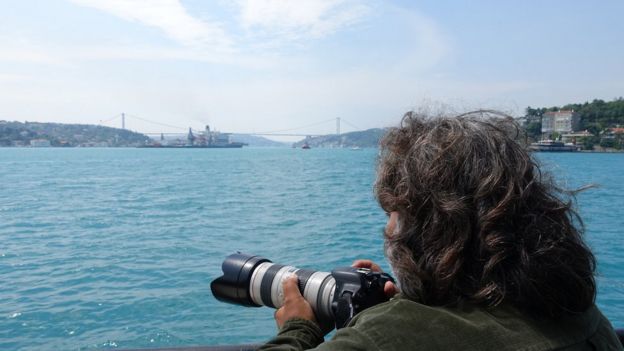 Image copyright Monica Whitlock
Image copyright Monica Whitlock And he's inviting me to come with him, though he adds: "I will feel very guilty if there is nothing on board."
Of course, I get up too. That's what I've come for.
Find out more
On the Black Sea: The Voyage Begins is available to listen to and download on the BBC iPlayer. The second part in the series will be broadcast on the BBC World Service on Wed 26 Jul 2017 at 03:32 BST.Welcome to the wacky - but politically, increasingly important - world of ship-spotting.
It's an international, highly collaborative, fraternity - yes, they're mainly (though not all) men - and Isik is one of its most passionate, energetic members.
He's a big man in every sense of the word - bear-like, generous and funny.
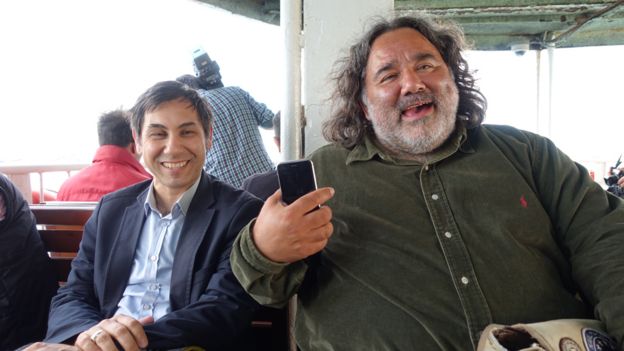 Image copyright Monica Whitlock
Image copyright Monica Whitlock "Many times I get up at two, three or four o'clock in the morning to see things," he says. "Yes, it's very painful. I destroy many days like this." And he laughs.
It's easy to understand how his addiction started. Partly it comes from living in Istanbul.
The Bosphorus - the gateway to the Black Sea for ships coming from the Mediterranean - isn't the only waterway in the world that's crowded with international shipping, but no other shipping lane as busy as this runs through the heart of a huge city.
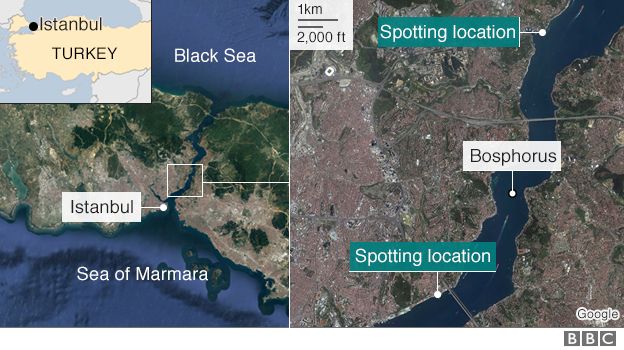
Only 700m wide at its narrowest point, the Bosphorus is so busy that to avoid accidents, the Turkish authorities operate a one-way system, regularly changing the direction of travel according to demand. Ships going the other way must wait at the northern or southern entrance.
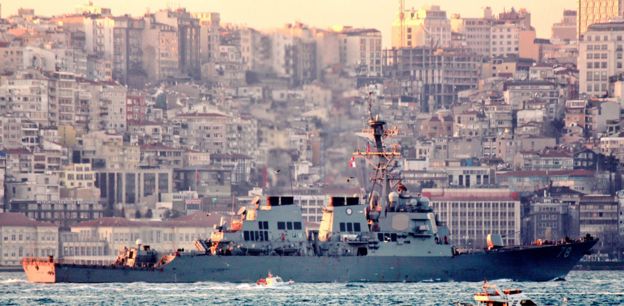 Image copyright Yoruk Isik
Image copyright Yoruk Isik "This ship spotting is a mirror of international relations, politics, what is happening now," he says.
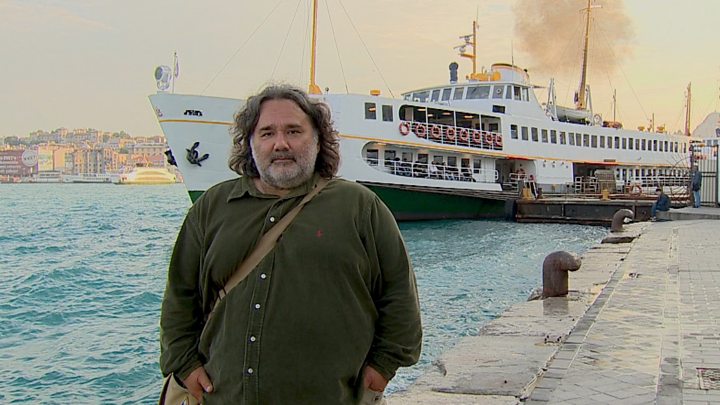
Isik - who earns a living as an international affairs consultant - logs the passage of boats of all kinds.
One he lay in wait for recently at a waterside cafe was the largest construction vessel in the world, the Pioneering Spirit, the length of six jumbo jets, passing through the Bosphorus on its way to lay the TurkStream gas pipeline off the Russian coast.
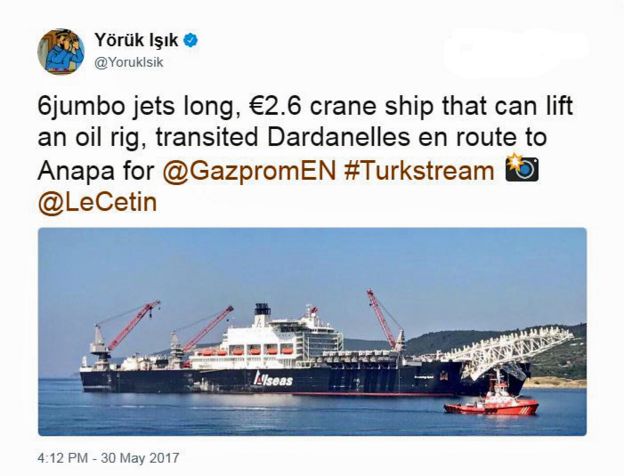 Image copyright @YorukIsik
Image copyright @YorukIsik But it's warships that most fascinate Isik and his ship-spotting friend Devrim Yaylali, who edits the Bosphorus Naval News website.
Yaylali, an economist, has been watching ships for even longer than Isik - since he commuted across the Bosphorus to school in his early teens, during the Cold War.
He was so curious about Soviet ships that one day he even skipped a school exam to photograph the aircraft carrier Admiral Kuznetsov, now the flagship of the Russian navy, on its inaugural passage through Istanbul.
Today Isik and Yaylali are kept busier and busier - naval traffic through the Bosphorus has increased since Russia annexed Ukraine's Crimean peninsula, on the northern side of the Black Sea, in 2014.
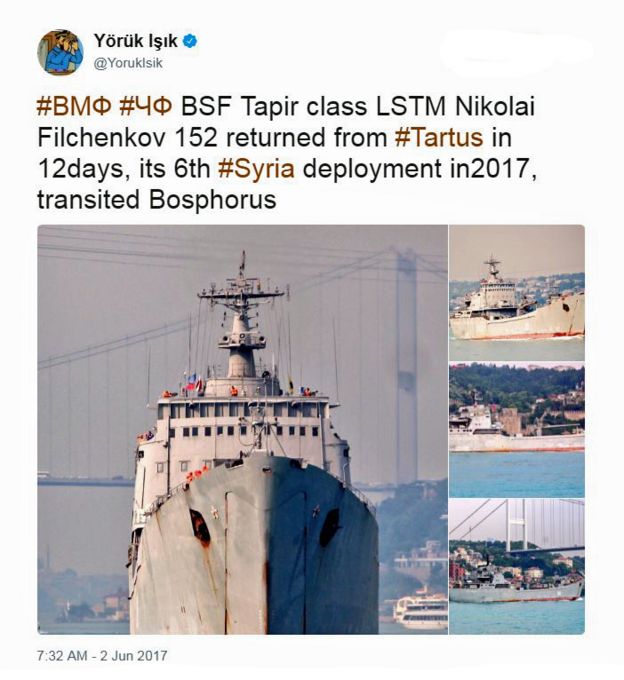 Image copyright @YorukIsik
Image copyright @YorukIsik "Russia has already bought three brand new Kilo Class submarines - and a fourth is about to come," Isik says.
"That shows their interest in asserting influence over the Black Sea."
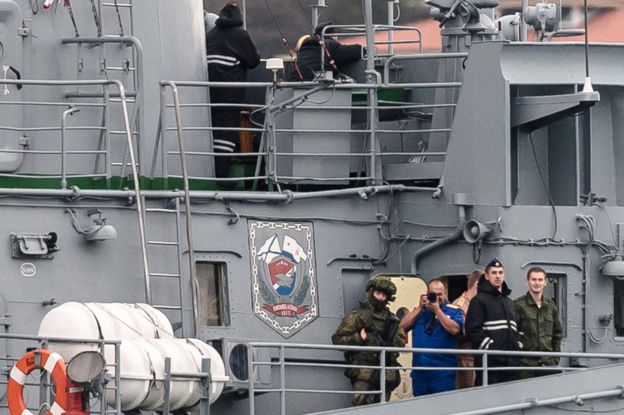 Image copyright Yoruk Isik
Image copyright Yoruk Isik In April, Isik spotted the UK destroyer HMS Daring passing through Istanbul - a rare Royal Navy operational deployment to the Black Sea.
"The current situation is more scary than the Cold War to me," he says. "There is the possibility, if not of more hot military action, certainly of more military face-offs."
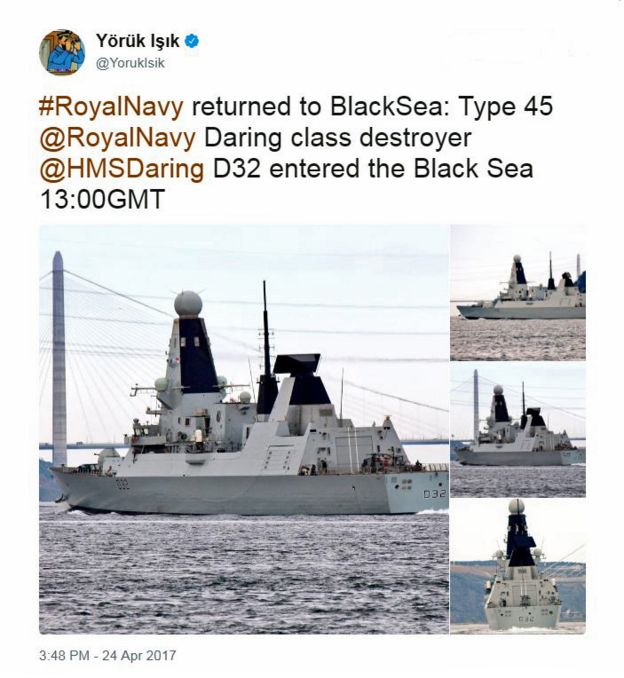 Image copyright @YorukIsik
Image copyright @YorukIsik All Russian ships travelling to Syria from Sevastopol or Russia's other Black Sea base at Novorossiysk must pass through the Bosphorus.
And sometimes, Isik says, Russia seems keen to flaunt its controversial campaign.
His most famous shot, taken in December 2015 - and retweeted around the world - was of a Russian soldier standing on the deck of a landing ship holding a shoulder-launched missile, an Igla rocket, as the vessel passed through the centre of Istanbul.
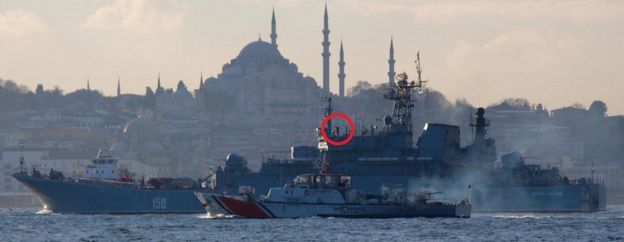 Image copyright Yoruk Isik
Image copyright Yoruk Isik But that image - taken shortly after Turkey shot down a Russian warplane for allegedly violating its airspace - was judged so provocative by Ankara that it sent a diplomatic note to Moscow in protest.
"I didn't even see (the rocket) with my naked eye - only when I downloaded the picture," Isik says.
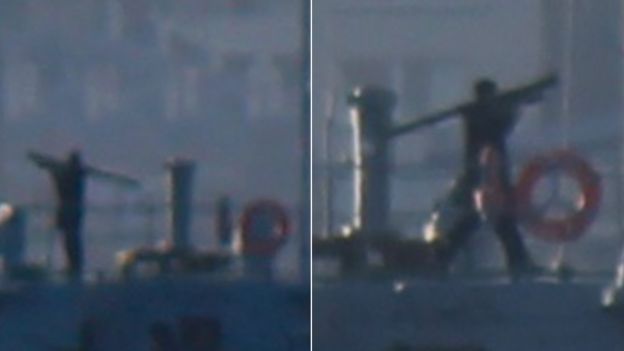 Image copyright Yorik Isik
Image copyright Yorik Isik As for the Aleksandr Tkachenko - the ship we've both given up our sleep for - it eventually emerges as predicted out of the early morning mist round a bend in the Bosphorus - loaded with row upon row of olive-green Kamaz military trucks.
Isik throws himself into a photographic frenzy.
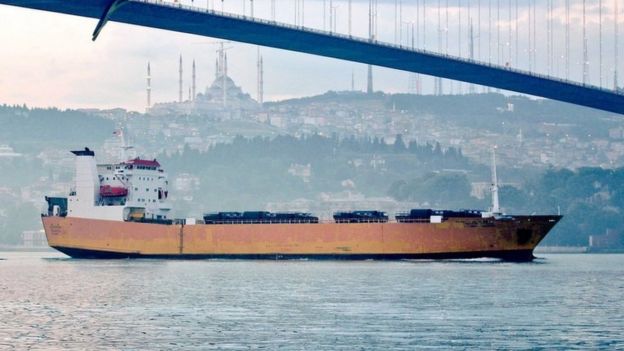 Image copyright Yoruk Isik
Image copyright Yoruk Isik "I was the first to notice that Russia was carrying military vehicles on civilian vessels and it showed even more that they were deepening their commitment."
"So, Tim, do you feel the excitement of the ship spotter right now?" Isik asks.
"I love mystery, and it's like a puzzle when we see ships carrying things from point A to point B - and with the help of other ship spotters you can solve this puzzle."
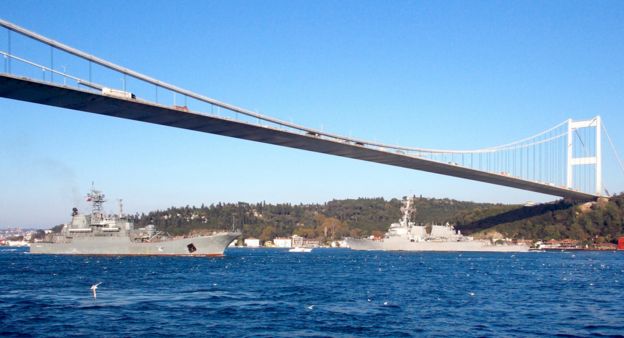 Image copyright Yoruk Isik
Image copyright Yoruk Isik 


Ingen kommentarer:
Legg inn en kommentar
Merk: Bare medlemmer av denne bloggen kan legge inn en kommentar.